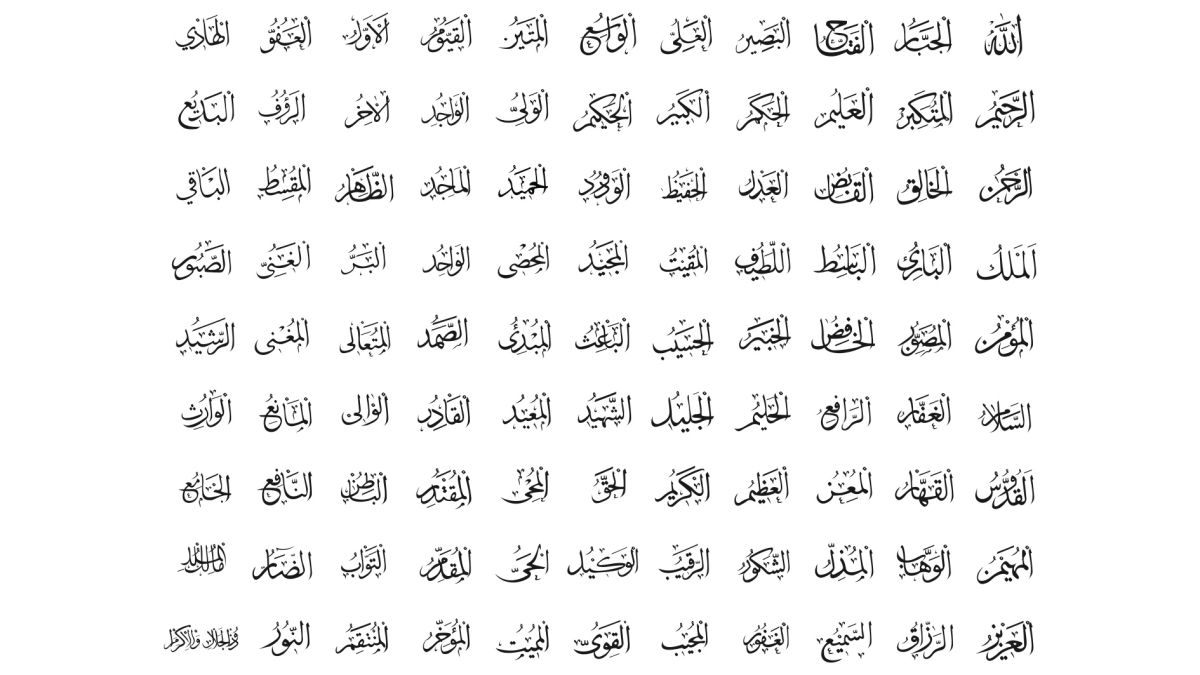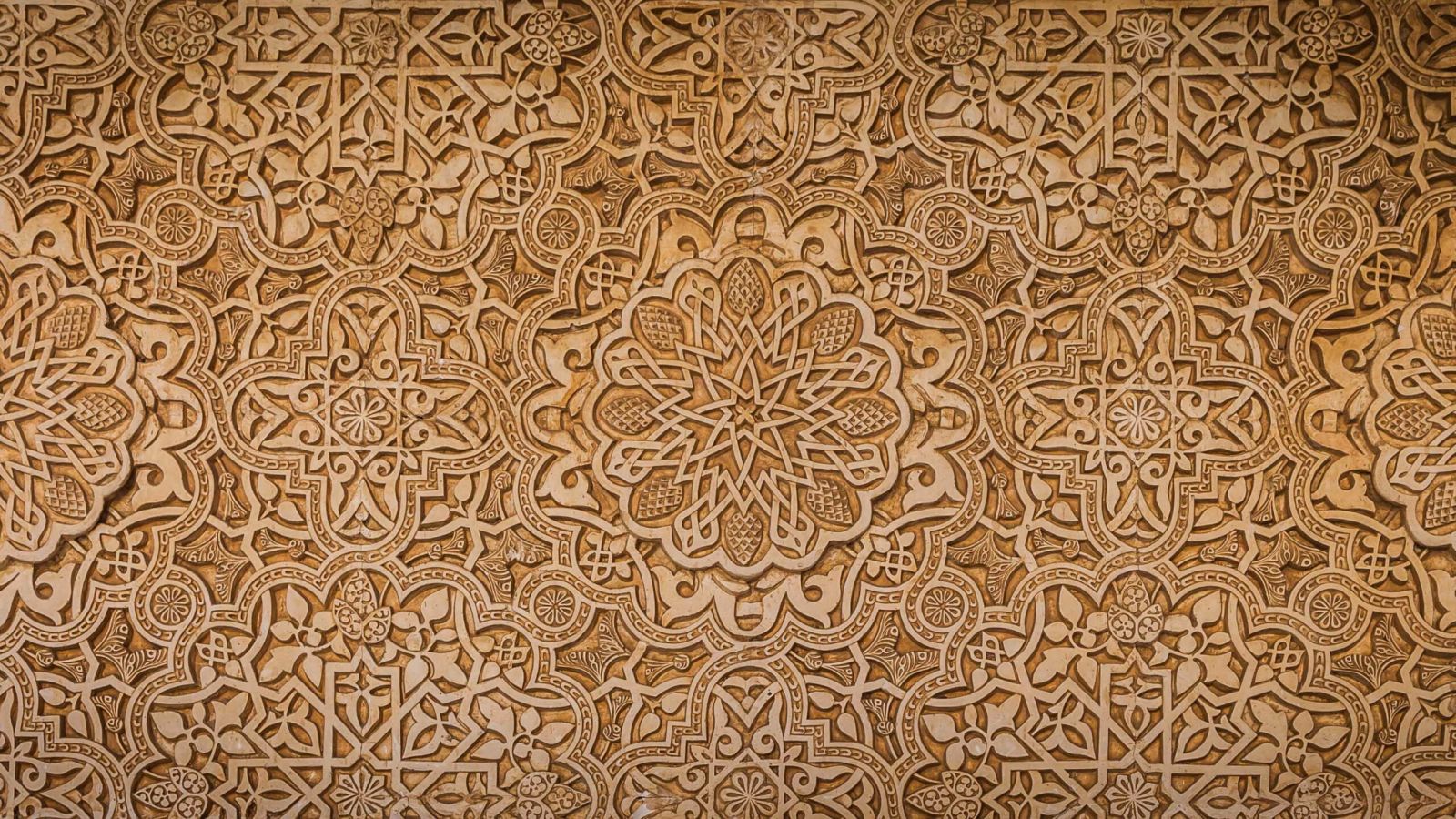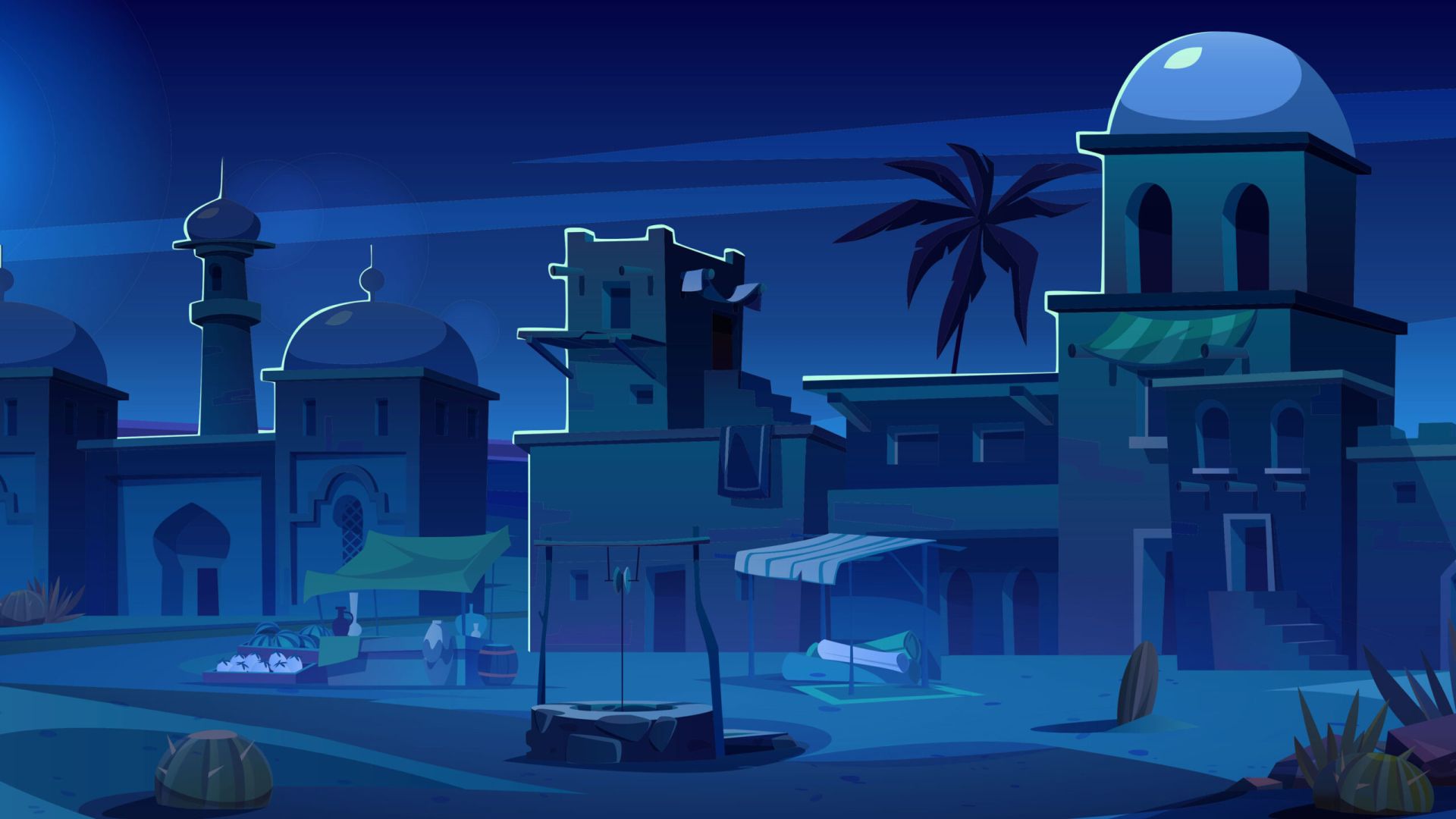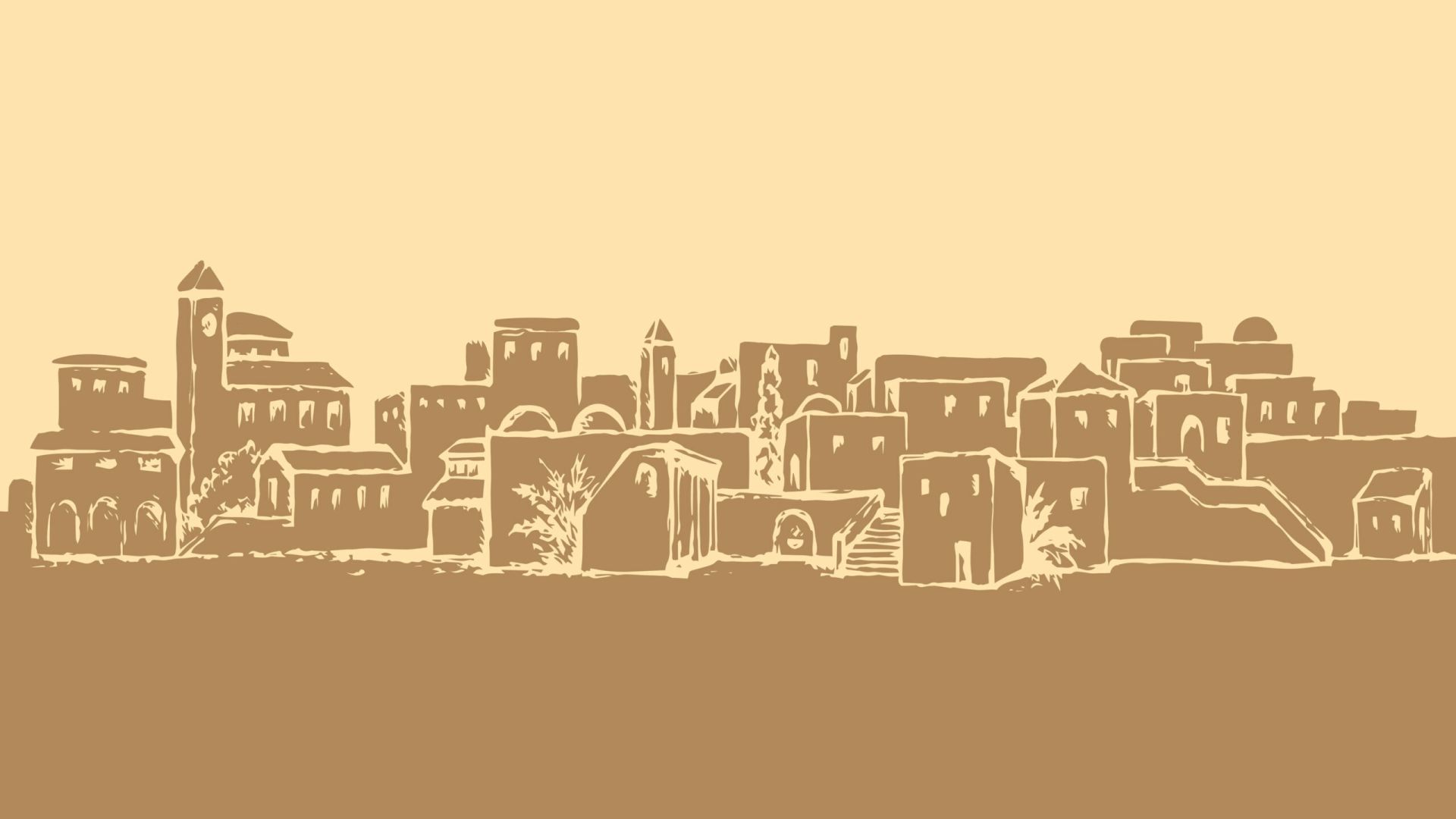A Simple Guide to Allāh’s Perfect Names and Lofty Attributes
Imām ʿAbd al-Raḥmān ibn Nāṣir al-Saʿdī
A Simple Guide to Allāh’s Perfect Names and Lofty Attributes
Imām ʿAbd al-Raḥmān ibn Nāṣir al-Saʿdī


- Al-Ghani (الغني): The Rich; Free of all Wants
- The Meaning of Al-Khāliq (the Creator), Al-Bāriʾ(the Inventor of all Things), Al-Muṣawwir (the Bestower of Forms)
- The Meaning of the Names of Allāh: al-Raḥmān (The Most Merciful to Mankind), al-Raḥīm (The Most Merciful to the Believers), al-Barr (The Most Subtle, Kind, Courteous, and Generous), al-Karīm (The Generous), al-Jawwād (The Magnanimous), al-Wahhāb (The Bestower), al-Raʾūf (The Kind)
- Al-Ḥakīm (The Most Wise)
- Al-Hayyī (the Shy One) and Al-Satīr (the One who Conceals)
- Al-Ḥalīm (the Most Forbearing) and Al-ʿAfuww (the Oft-Pardoning)
- Al-ʿAzīz (العزيز): the Almighty
- Al-Mutakabbir (المتكبر): The Supreme
- Al-Qahhār (القهار): The Prevailing, The Irresistible
- Al-Jabbār (الجبار): The Compeller
- Al-Qawī: The All-Strong, the Powerful
- Al-Matīn (المتين): the Possessor of Mighty Strength
- Al-Ṣabūr (الصبور): the Most Patient
- Al-Raqīb (الرقيب): the All-Watcher and al-Shahīd (الشهيد): the One Who is All-Sufficient as Witness
- Al-Ḥafīẓ (الحفيظ): the Protector or Guardian
- Al-Laṭīf (اللطيف): the Most Courteous
Al-Ghani (الغني): The Rich; Free of all Wants
Allāh—the Most High—said:
يَا أَيُّهَا النَّاسُ أَنتُمُ الْفُقَرَاءُ إِلَى اللَّهِ ۖ وَاللَّهُ هُوَ الْغَنِيُّ الْحَمِيدُ
“O mankind! It is you who stand in need of Allāh, but Allāh is Rich (free of all wants and needs), worthy of all praise.”
(Fāṭir, 35:15)
He—the Most High—is al-Ghani: The One who has complete and encompassing richness, in every conceivable way. This is because of His complete perfection and the perfection of His attributes such that no form or manner of deficiency may be associated with Him. He could not be except in a state of complete richness, for this is among the stipulations of His essence. Just as He shows nought but good treatment, magnanimity, courteousness, compassion and generosity to His creation. While His creations are unable—regardless of circumstance—to free themselves of their need for Him. They are completely dependent upon Him to be brought into existence, to survive and subsist, and for all of their wants and and needs. From the encompassing manner of His richness is that the treasures of the heavens and the earth and mercy are all in His hands. His goodness and magnanimity towards His creation is continual, occurring at every minute and in every instance, greatly and perpetually flowing from His hands days and night1. His goodness towards His creation is indeed abundant.
Also representative of His richness and generosity towards His creation is that He has commanded His servants to invoke Him, promising to answer their invocations and grant them their requests2. Giving them both that which they have requested and what they have not. The perfection of His richness is also exemplified in that if the first and last of the creation were to all gather in a single plane to seek their individual needs from Him, He would grant each and every one among them their requests, fulfilling their wishes and hopes, while His dominion is not lessened by even an atom’s weight3. Also representative of the perfection of His richness and His encompassing boons are the various forms of pleasure, unending enjoyment and perpetual bliss which He has stretched forth for the people who occupy the home of His generosity [Paradise]. The enjoyments contained therein have never been seen by any eyes, nor have ears ever heard of, nor could the human heart even fathom.4
It is also from the perfection and completion of His richness that He has not taken a companion or a son, nor a partner that shares in His kingdom, nor does He have need of a protector out of weakness. For He is the Rich by means of the complete perfection of His characteristics and attributes, the bestower of riches to His creation.
The Meaning of Al-Khāliq (the Creator), Al-Bāriʾ(the Inventor of all Things), Al-Muṣawwir (the Bestower of Forms)
Allāh is alone in His creation of everything (al-Khāliq, al-Bāriʿ). He has created all creatures with wisdom, fashioned them with accurate precision (al-Muṣawwir) and exemplified the creation of everything in existence. He created and originated it, bringing it into being at its appropriate time. He set the proportions of the creation in the most exemplary manner, composing it with perfection and mastery, then guided His creation to the means of its livelihood, survival and uprightness. He granted every created being its most appropriate and applicable form, then guided them to partake in that which has been prepared and created for their use.5
If He alone is the Creator, Inventor of all things, and Bestower of forms, possessing no partner in any of these actions, then He is the only deity worshipped in truth. There is none besides Him deserving of any form of worship. For He is the creator of the essences, actions and attributes of His creation. He guides whom He wills and sends astray whom He wills. He allows the believer to believe and the disbeliever to disbelieve, without forcing or compelling His servants to engage in that which is undesirable to them.
The encompassing nature of His creation refutes the Qadariyyah sect6 who claim that the actions of His slaves—both obedient and disobedient acts—are not among His creations or ordainments. They allege this claim as a “precaution”, fleeing from the belief that Allāh has forced or compelled His servants to engage in their actions. All the while they remain ignorant that Allāh’s perfection, and the perfection of His abilities negate such compulsion. Rather, He is fully able to allow His servants to engage in actions of His choice, which He wants and are also consistent with His divine preordainment and will. His matter is greater than having to compel His servants, more equitable and just than ever oppressing them. Instead, they are the ones who desire and choose the actions they engage in, and He is the one who allows them to do so. The wants and abilities of the servants are in complete agreement with Allāh’s will.
لِمَن شَاءَ مِنكُمْ أَن يَسْتَقِيمَ ﴿٢٨﴾ وَمَا تَشَاءُونَ إِلَّا أَن يَشَاءَ اللَّهُ رَبُّ الْعَالَمِينَ
“To whomsoever among you who wills to walk straight, and you will not, unless (it be) that Allāh wills, the Lord of the ʿālamīn (mankind, jinns and all that exists).”
(Al-Takwīr, 81:29)7
The Meaning of the Names of Allāh: al-Raḥmān (The Most Merciful to Mankind), al-Raḥīm (The Most Merciful to the Believers), al-Barr (The Most Subtle, Kind, Courteous, and Generous), al-Karīm (The Generous), al-Jawwād (The Magnanimous), al-Wahhāb (The Bestower), al-Raʾūf (The Kind)
The meanings of these glorious names of Allāh are close to one another. All of them prove that He may be described with mercy, encompassing piety and righteousness, the bestowment of frequent blessings, tenderness, and compassion. For every single blessing, beloved matter, that which causes happiness, or represents goodness that has been bestowed in the heavens and the earth are from Him. They represent His mercy, goodness, majesty and blessings. Just as the aversion of misfortunes, punishment, and fearful and harmful occurrences represent nought but his mercy and piety. As none is able to bring forth goodness save for Him. Just as none is able to avert evil save for Him.8
The Mercy of the Most High precedes His anger and overcomes it.9 The apparency of His mercy in His creation is undeniably evident. For He has inhabited the regions of the heavens and earth with creations, allowing them to possess hearts full of tenderness to other created beings by means of the mercy He has distributed among them, instilling it in their hearts. To the extent that even wild animals show tenderness and mercy to their offspring, despite their compassionate actions not proffering benefit to them, nor does it lead to a resultant outcome, reward, or punishment. Rather, the great love, affection, and compassion that is witnessed from them testifies as to the great care and attention of their Creator and His encompassing mercy. He granted boons comprehensively to all inhabitants of the heavens and earth. Then, he has made that which benefits them easily accessible, including their sustenance and provision. The avenues and paths towards their attainment are eased and simplified. And there is no moving, living creature on earth save that its provision is due from Allāh. And He knows its dwelling place and its depository (in the uterus, grave, etc.).10
He—the Most High—knows the matters that lead to their uprightness, righteousness, and goodness, which they themselves are ignorant of. Such that he has ordained the occurrence of these matters for them despite some of them being undesirable to them, whose goodness they lack the ability to fully comprehend. It may be that He allows misfortune to afflict them such that, by means of it, they arrive before that which is beloved to them. He shows them mercy through the afflictions of pain and catastrophe. For all manner of pain represents goodness for the believer who occupies himself with the station of patience. “How fascinating is the matter of the believer! All his matters pertain to goodness. If he is met with that which gladdens him, he is thankful and that is better for him. If he is afflicted with that which harms him, he is patient and that is better for him. For such applies to none save for the believer.”11 And it may be that you dislike a thing which is good for you and that you like a thing which is bad for you. Allah knows but you do not know.12
His mercy is similarly apparent in His legislations and commands, as is plainly evident to those granted insight, precise discernment and accurate perception. Those who possess understanding fully admit to this fact. His legislation represents an illuminating light, mercy, and guidance. It consists of mercy, facilitating one displaying the most exalted forms of that mercy, leading to honour, happiness and success. Just as He has ordained in His laws that which eases the affairs of the people, simplifying them, negating their difficulties and hardships. All of which unequivocally proves the encompassing nature of His mercy, goodness and majesty. Just as there is mercy in that which He has made forbidden. For it represents a means towards protecting the religion of His servants, maintaining their intellects, honourable standings, their physical wellbeing, their conduct and behaviour, and their wealth from evil and harm. Thus do all of his prohibitions ultimately relate to the protection of these matters. Also, his orders are further eased by their respective means—some of which are legislated while others are ordained. This represents the completion of His mercy. Just as his prohibitions are surrounded by hindrances and obstacles that prevent engagement with them, except for the one who chooses rejection; obstinately engaging in those disobedient acts whose actions hold no goodness. He has also legislated deterrents and impediments in addition to legislated capital punishments, designed to further prevent the servant’s engagement in these forbidden actions, discouraging them from it. Reducing the occurrences of evils in society to a great extent.
In general, His legislations and orders have only been ordained with comprehensive mercy, allowing one to arrive before eternal mercy and perpetual happiness (in the hereafter).13
Al-Ḥakīm (The Most Wise)
He—the Most High—is described with perfect, flawless wisdom; the passing of perfect, unerring and completely just rulings among his creation. Al-Ḥakīm is the One whose knowledge is vast and encompassing, whose acquaintance is comprehensive of both the impetus for all matters and their eventual repercussions. To Him belong magnanimous praise, complete ability, and great mercy. He is the One who situates everything in the place that is most appropriate for it, allowing it to occupy a station that is befitting both in terms of His creation of it and His command over it. He is, therefore, not deserving of ever being questioned, nor should an iota of criticism ever apply to His wisdom.
Wisdom in His Creation
His wisdom is of two types: The first is wisdom that applies to creation. For He has formed the creation in truth,14 their existence represents and entails the truth,15 just as the goal and result from their creation is truth.16 He has formed the creation using the most exemplary, excellent of systems, ordered and orchestrated in the most perfect manner. He grants every created being the physical form that is most suitable and befitting.17 Rather, he has even granted every single portion of each created being, every limb and appendage of every animal in existence its form and appearance. Thus, none shall ever discover a discrepancy, error, fault, or rift in His creation.18 If the intellects of the creation—the first to the last of them—were to all gather for the express purpose of imitating or mirroring the creation of the Most Merciful, or even to create that which possesses similarities to it in all its splendour, intricacies, and systematic order, they would find themselves woefully unable to do so.19 For how could they ever possess such an ability? Instead, the more intellectual and wise among them should suffice with being acquainted with the many wisdoms behind His creation, seeking true realisation of its excellence and perfect form. These are obvious matters, beyond doubt, as evidenced by His greatness, the perfection of His attributes, and the wise directives that entail His creation and commands. Concerning this, He challenges and orders His servants to observe, repeatedly examine, and contemplate whether any discrepancy or fault exists in His creation. Without a doubt, their perception of the creation is rendered weary and exhausted, unable to criticise a single aspect of the creation.
Wisdom in His Legislative Command
The second type of wisdom is that which applies to His legislation and commands. For He—the Most High—has only instated legislation, revealed books, and sent messengers such that His servants may worship Him and enact His commands. So what wisdom could be more exalted or possess greater renown than this? What blessing or show of generosity could be superior to this? For indeed knowing Him—the Most High—and worshipping Him alone while ascribing no partners or equals to Him, engaging in acts of righteousness sincerely for Him alone, while praising and showing gratitude to Him and commemorating Him all represent the greatest of gifts from Him to His servants. No other blessing is comparable to this. For it is the most exalted of blessings granted to the one whom Allāh has chosen to bless, just as it represents the most complete form of happiness for that person, their hearts and souls blissful in relation to it, while also being the reason for one’s arrival at eternal happiness and unending enjoyment (Paradise). For if there existed no other great wisdom in His legislation and commands except for this worship—which is at the very foundation of all goodness, representative of the most perfect and complete forms of blissful enjoyment, for which the entire creation was formed, for which their recompense is actualised and Paradise and Hell have been created—it (i.e. the legislative command to worship Him) would have been a sufficient purpose for creation.
Despite this, His legislation and religion have encompassed every single matter of goodness, filling hearts with knowledge, certainty and īmān, while establishing the correct, sound, creed. By means of it, the hearts find uprightness and are guided to the straight path, ridded of their corruption and deviation, producing the most beautiful exemplary results, leading to acts of righteousness, guidance and goodness. Just as its commands and prohibitions represent the very pinnacle of wise directives and correctness, righting the wrongs of one’s religious and worldly existence. For the commandments of this religion are either complete goodness or their goodness outweighs any attributable harm. Just as it prohibits all actions that represent complete, unadulterated harm, or whose harm is greater than any good that may be attributable to it.20
The Worldly Life Is Corrupted by Abandonment of His Legislation
Among the wisdoms attributable to Islamic legislation, just as it represents the most potent means by which one is able to attain goodness and uprightness of his heart, conduct and manners, his actions and close adherence to the straight path, it is also the most beneficial means by which uprightness is found in the matters of this worldly life which will never truly be considered sound, correct or upright until one has adopted the religion of truth, as implemented by Muḥammad (صلى الله عليه وسلم). This is an easily recognisable, witnessed fact to every truly intellectual person. For when the ummah of Muḥammad (صلى الله عليه وسلم) were closely adherent to the fundamental teachings of this religion and its offshoots, they occupied the very pinnacle of steadfastness and goodness. It was only as a result of their corruption and abandonment of its lofty teachings and most of its guidance that their worldly affairs became similarly corrupt, reflecting and mirroring their own religious corruption. Contemplate also the fall of the other nations that had previously achieved great military strength, possessing prodigious civilizations and societies. Despite this, because they were devoid of the spirit of this religion—its mercy and justice, the ultimate harm attributable to these societies superseded any benefit, their evil far outweighing their good. For their scholars, rulers, and governors were all woefully unable to ward off the rampant evil that had spread among them, and they shall persist in this inability insofar as their deviated condition remains. For this reason, it is a manifestation of Allāh’s wisdom that the religion, the Qurʾān exemplified by Muḥammad (صلى الله عليه وسلم) is itself among the greatest portents of his (صلى الله عليه وسلم) truthfulness and the soundness of his path. For its judgements and laws are perfect, complete and masterful, true uprightness may not be attained without them.
In conclusion, the name ‘the Most Wise’(الحَكِيم) pertains to both creation and legislation, as both occupy the very pinnacle of perfection and mastery. He is the most wise in terms of His rulings that pertain to creation and existence, the rulings of His legislation, and the rulings associated with His reward and punishment. The difference between the rulings of His creation and existence and those related to His legislation is that those that pertain to creation and existence relate only to that which He has chosen to bring into existence, formed and predestined to occur. As whatever He wills shall come to pass, and whatever He does not (will) shall never occur. While His legislated rulings relate to the rulings that He has legislated religiously. The servant will find himself subject to one or both of these rulings. As for those who engage in that which is beloved and pleasing to Allāh, they would have enacted that which is consistent with both the rulings of creation and existence, while also abiding by the rule of His religious legislation. As for the servant that engages in actions deserving of His displeasure, he has enacted only His rule of creation and existence as these acts would have only occurred following Allāh’s predestination of them but, due to them not being among the actions that are beloved or pleasing to Him, they are devoid of His religious, legislative rule. Goodness, evil, acts of obedience and disobedience all inclusively fall under His rule of creation and existence, while only that which is beloved and pleasing to Him may be additionally classed under His religiously legislated rule.
And Allāh knows best.
Al-Hayyī (the Shy One) and Al-Satīr (the One who Conceals)
The Prophet (صلى الله عليه وسلم) said: “Indeed, Allāh is shy; He shies away from His servant who has extended his hands [in invocation] that he should allow them to drop with nothing”.21
This is representative of His extreme mercy, generosity, perfection, and forbearance. For a servant engage in acts of disobedience before Him, despite possessing dire need for Him to the extent that he is unable to be disobedient except with the utilisation of Allāh’s blessings with which he fortifies and nourishes himself (i.e. food and provisions), but the Lord—despite Him being completely independent of the creation, possessing no need for them—in manifestation of His generosity He shies away from immediately shaming, exposing and punishing this servant. Rather, he shields, preserves and protects him by various means He has ordained. He forgives and pardons him. Allāh shows His love for His servants through perpetual blessings, while they respond hatefully and disdainfully by engaging in His disobedience. Not a moment passes except that Allāh’s goodness descends on them, all the while their evil ascends to Him in return. The Most Generous, the True King is in constant continual receipt of this, acts of disobedience and contemptible obscenities ascending to Him from His creation, all the while He—the Most High—shies away from exacting immediate punishment upon the one whose hair has turned white from old age upon Islām. Such that He refuses to allow the one who raises his hands in invocation to Him to drop with futility, having received nothing in return. Additionally, He encourages and invites his servants to invoke Him, promising to answer them. He is the Shy One, the One who Conceals22 and loves those who conduct themselves with shyness, concealing themselves, maintaining their privacy. For whomever protects the privacy of another Muslim will have his privacy maintained in this life and the hereafter.23 For this reason, it is most detestable to Allāh that a servant broadcasts his own transgression, informing and spreading the news of his own malfeasance among the people. Instead, a servant should repent to Allāh and avoid revealing his misdeeds to the people. For indeed, among the most obscene, disgraceful, and hated individuals are those who spend the night in sin under the concealment of Allāh but, upon awakening the following day, they choose to cast off Allāh’s concealment of their state.24 As the Most High said:
إِنَّ الَّذِينَ يُحِبُّونَ أَن تَشِيعَ الْفَاحِشَةُ فِي الَّذِينَ آمَنُوا لَهُمْ عَذَابٌ أَلِيمٌ فِي الدُّنْيَا وَالْآخِرَةِ
“Verily, those who like that (the crime of) illegal sexual intercourse should be propagated among those who believe, they will have a painful torment in this world and in the Hereafter.”
(Al-Nūr, 24:19)
Al-Ḥalīm (the Most Forbearing) and Al-ʿAfuww (the Oft-Pardoning)
The aforementioned also acts as indications for the name al-Ḥalīm (the Most Forbearing). The forbearance of Allāh is comprehensive of the people of disbelief, rebellious sinners and the disobedient. Allāh has chosen not to punish these oppressive groups with immediacy. Instead, He grants them respite such that they return to Him in repentance, not to facilitate their continuation of transgression and engagement in misdeeds. That is, He—the Most High—is al-Ḥalīm (the Most Forbearing) to whom perfect, complete forbearance belongs. He is also al-ʿAfuww (the Oft-Pardoning) to whom comprehensive, encompassing pardon belongs. These two attributes pertain to the sins perpetrated by the disobedient, and the oppression of the criminal transgressors. For indeed sins necessitate the occurrence of immediate punishment of various kinds, but His forbearance stipulates the sinner being granted respite in the hopes of his eventual repentance. His pardon additionally stipulates complete forgiveness of the perpetrated sin, especially if the transgressor enacts the varying means towards forgiveness including engagement in true repentance, possessing īmān, and carrying out acts of righteousness. His forbearance is sufficient to fill the heavens and the earth as, were it not for Him being Oft-Pardoning, there could not remain a single moving creature on the surface of the earth. He—the Most High—is Oft-Pardoning and loves to pardon His servants, and loves that they engage in the means that would ultimately lead to the attainment of this pardon by actively engaging in actions deserving of His pleasure and by showing goodness in one’s treatment of the creation.
Also among the manifestations of His complete pardon is that those who have transgressed in opposition to themselves will have all their past sins—whether major or minor—forgiven, provided they turn to Him in true repentance. He has also ordained that embracing Islām erases all (sins) that precedes it, just as true repentance cleanses all previous misdeeds.
Al-ʿAzīz (العزيز): the Almighty
Al-ʿAzīz (the Almighty) is the One to whom all forms of power and might belong:
إِنَّ الْعِزَّةَ لِلَّهِ جَمِيعًا
“All power and honour belong to Allāh.”
(Yūnus, 10:65)
He is the Almighty in relation to the complete perfection of His strength; that is, His strength is mighty. Also in this vein are His names al-Qawī (the Strong), al-Matīn (the Possessor of Mighty Strength).
His might also applies to the ability to prevent others from ever being able to overcome Him, or that anyone could ever subject Him to their will, or independently harm or benefit His servants. This might and greatness would also include Him not being associated with that which is unbefitting of His greatness and majesty in the form of deficiency and error or any other characteristic that would negate His perfection.
The scholars have divided the attribute of might into three categories:
- Might that pertains to complete ability. That is, the One whose ability is great, to whom no equivalent exists. As the Arabs used to say: This person is ʿAzīz; meaning ‘the likeness of his ability is rare amongst us’. This is might as it pertains to ability.
- Might of subjugation: that is, the ability to overcome. The most frequent usage of this name is in this context. Al-ʿAzīz means the One who overcomes or overwhelms others. This meaning is inherent in His saying:
وَلِلَّهِ الْعِزَّةُ وَلِرَسُولِهِ وَلِلْمُؤْمِنِينَ
“But honour, power and glory belong to Allāh, His Messenger (Muḥammad (صلى الله عليه وسلم)), and to the believers.”
(Al-Munāfiqūn, 63:8)Which is reply to the statement made by the hypocrites:
لَئِن رَّجَعْنَا إِلَى الْمَدِينَةِ لَيُخْرِجَنَّ الْأَعَزُّ مِنْهَا الْأَذَلَّ
“If we return to Al-Madīnah, indeed the more honourable (ʿAbdullah bin Ubayy bin Salūl, the chief of hypocrites at Al-Madīnah) will expel therefrom the meaner (i.e. Allāh’s Messenger (صلى الله عليه وسلم)).”
(Al-Munāfiqūn, 63:8) - Might of prevention: that is, prevention of all evil and deficiency from being ascribed to Him, despite the criminal sinners attempts to ascribe deficiencies to Him. For His might rejects that such things shall ever be associated with Him.
Thus, Allāh—the Exalted in Might— is both al-Qawī (the Strong) and al-Ghālib (the One who Overcomes or the Victor). The One who combines these two attributes possesses complete sovereignty and dominion. This is because among the creation are those who may possess strength but lack the ability to overcome or be victorious over others. For example, if there was an extremely strong man—as strong as a horse—who was also a coward, he would lack the ability to gain victory over anyone. His cowardice is a blockade before him. However, when strength is accompanied by might, one’s dominion is complete and perfected.25
Al-Mutakabbir (المتكبر): The Supreme
This aforementioned meaning (of might) is also inherent in His name al-Mutakabbir (the Supreme). Al-Mutakabbir is the One to whom perfect and complete greatness belongs, at the very pinnacle of supremeness and majesty, while also extending to the aforementioned meaning of the One whose greatness excludes Him from—and is far above—ever being attributable to that which is unbefitting of His greatness, gloriousness, and majesty.
Al-Qahhār (القهار): The Prevailing, The Irresistible
The third application of this might is in relation to the ability to subjugate others, which is also inherent in His name, al-Qahhār (the Prevailing, the Irresistible). Al-Qahhār is the One who has subjugated all of the creation with His power and might. All of existence is close to Him. The foreheads of all of His servants are in His hands. He controls and disposes the affairs of His dominion and all sovereignty over the creation resides in His hand. Whatever He wills is brought into existence, and whatever he does not shall never come to pass. The worlds of the heavens and the earth—with all its magnanimous creations—all submit in obedience and subservience to the true owner and disposer of their affairs, in their movements and moments of rest, in the actions they engage in and what they choose to leave. They exert no real command, order, or ability to pass judgement over their own affairs26; rather, their affairs belong wholly to Allāh.27 The passing of all rulings—whether legislated in His religion, or related to that which is in existence, or the reward or punishment of His creation—completely belong to Allāh. There is no true judge besides Him, just as there is no Lord save for Him, and nothing is deserving of worship except for Him.
Al-Jabbār (الجبار): The Compeller
The ability to subjugate others—which is a branch of the meaning of the Almighty—is also one of the meanings of al-Jabbār (the Compeller). Also among the meanings of the Compeller is that Allāh is the Most High, far above all else, who has risen over His throne, presiding and encompassing His dominion, exerting His ownership and sovereignty over it, disposing of all its affairs.
Also among the meanings of the Compeller is the one who shows kindness, courteousness, mercy and compassion. For He is the One who fortifies and provides succour to the ailing, grants wealth to the impoverished, provides relief to the sick and those tested with catastrophe. He is the one who provides a specific, particular aid to those whose hearts have broken before His majesty, who have submitted in obedience before His perfection, who hope for His blessings and boons all in relation to the love they possess for Him, and the various ways they recognise His lordship over them; a recognition and love which He has instilled in their hearts. Also in relation to great victories and successes He has granted, as well as the guidance He has bestowed, and the traversal of the straight, upright path, the ability to act in accordance with guidance, and to be sound and correct in methodology.28
Al-Qawī (القوي): The All-Strong, the Powerful
Al-Qawī (the All-Strong) is the opposite of the one who possesses weakness; that is, the One who possesses complete strength, to whom no weakness is attributable. Let us ask ourselves: Do we possess complete strength? The answer is: no, then again a resounding ‘no’, then again a resounding ‘no’. Then, will our admittedly deficient strength persist over the course of our lives? The answer is: ‘no’. Then, were we granted this deficient strength from the times of our births? The answer is: ‘no’. Listen to the statement of Allāh—the Exalted in Might:
اللَّهُ الَّذِي خَلَقَكُم مِّن ضَعْفٍ ثُمَّ جَعَلَ مِن بَعْدِ ضَعْفٍ قُوَّةً ثُمَّ جَعَلَ مِن بَعْدِ قُوَّةٍ ضَعْفًا وَشَيْبَةً
“Allāh is He Who created you in (a state of) weakness, then gave you strength after weakness, then after strength gave (you) weakness and grey hair.”
(Al-Rūm, 30:54)
Allāh mentions two periods of weakness in this verse. For such is the plight of the human being. There is no escape from it. Whereas Allāh is the Possessor of complete strength that shall never falter, comprehensive of the past, present and future.
Then, listen to the statement of pride and arrogance made by the people of ʿĀd regarding their power and might:
فَأَمَّا عَادٌ فَاسْتَكْبَرُوا فِي الْأَرْضِ بِغَيْرِ الْحَقِّ وَقَالُوا مَنْ أَشَدُّ مِنَّا قُوَّةً
“As for ʿĀd, they were arrogant in the land without right, and they said: “Who is mightier than us in strength?””
(Fuṣṣilat, 41:15)
So, Allāh—the Exalted in Might—answers them saying:
أَوَلَمْ يَرَوْا أَنَّ اللَّهَ الَّذِي خَلَقَهُمْ هُوَ أَشَدُّ مِنْهُمْ قُوَّةً
“See they not that Allāh, Who created them was mightier in strength than them.”
(Fuṣṣilat, 41:15)
Allāh is the Greatest! If the modern-day Americans were to proclaim: “Who is mightier than us in strength?!” What should our answer be? We answer: Allāh is the One who has created you. You are but created weaklings. Had Allāh willed, he would have wrested away your strength, ability and intellect. For He—the Most High—is the One who has created you and thus He is mightier in strength than you shall ever be. This applies to all countries that show arrogance in their material, physical power. We say: Above you is the Lord of all the servants—the Exalted in Might—who has created you from nothing. He is mightier than you in strength. Then, also the removal and faltering of the creation’s might may even stem from within, just as the Soviets —at one point in time—represented a global threat. However, Allāh weakened them from within, causing their might and strength to crumble internally.
The most important aspect of this matter is that Allāh is the Possessor of complete strength, to whom no weakness shall ever be attributable.
Of note here also is the difference between ability and strength, and inability and weakness. Strength is the antithesis of weakness as evidenced by the aforementioned verse: “then gave you strength after weakness”. While inability in the opposite of ability as evidenced by Allāh’s statement:
وَمَا كَانَ اللَّهُ لِيُعْجِزَهُ مِن شَيْءٍ فِي السَّمَاوَاتِ وَلَا فِي الْأَرْضِ ۚ إِنَّهُ كَانَ عَلِيمًا قَدِيرًا
“Allāh is not such that anything in the heavens or in the earth escapes Him. Verily, He is All-Knowing, All-Omnipotent.”
(Fāṭir, 35:44)
Notice that Allāh did not end the verse saying “the All-Knowing, the All Strong”. So which is the more perfect or completely encompassing name: the one that denotes complete ability or complete strength? We answer: This differs in accordance with the subject. As for ability, it applies only to a being that has the capacity to want or desire. For example, you cannot describe a wall as being able. While the term strength may apply to a being with the capacity to want and that which does not possess this capacity. For example, you may say: “this wall is strong, or these rocks are strong” but you may not say: “This wall or rock is able”.
Then, the attribute of strength is more encompassing than the attribute of ability in other ways. This is because not everything that possesses ability necessarily also possesses strength. For example, if we were to test one of you, saying: “Lift this rock” and the one being tested is unable to even move it from the ground, would we describe him with inability or that he is lacking in strength? The answer is that he is lacking in ability as he was unable to even disturb its position.
Then, if we were to say to another “Lift this rock”, and he rolls his sleeves up and lifts it with difficulty, shaking under its weight, we would say: He lacks strength, but possesses ability. In this way, we have elucidated that the meaning of strength in this context is more encompassing, as it denotes the ability to enact a task while being completely devoid of weakness.29
Al-Matīn (المتين): the Possessor of Mighty Strength
Regarding al-Matīn, Ibn ʿAbbās (رضي الله عنه) said: it means the severe. That is, the One who is severe in strength and in might; severe in all attributes that pertain to power and omnipotence. In the Qurʾān, it is mentioned as a name that further reinforces the name al-Qawī.30 31
It means the One who possesses all strength and ability, with which these great physical creations that occupy the heavens and the earth were brought into existence. With which all affairs, both seen and unseen are controlled and disposed of, His will is implemented completely within all of the creation. Whatever He wills shall come to pass, and what He does not shall never occur. The one who flees from Him shall never escape, nor can a soul extricate itself from the confines of His dominion, or strength. He is the One who provides for everything in existence. His strength and ability allows Him to resurrect the dead whose flesh has been rendered decrepit and rotten from decomposition, reduced to wind-strewn dust, feasted upon by predatory birds and scavengers, separated and scattered about in a desolate wasteland or the bowels of the ocean. None escapes Him; for He knows the portions of their bodies claimed by the earth. So Glory be to the Strong, the Possessor of Mighty Strength.32
Al-Ṣabūr (الصبور): the Most Patient
Imām ʿAbd al-Raḥmān ibn Nāṣir al-Saʿdī said:
The name al-Ṣabūr is taken from from the ḥadīth: “There is none more patient than Allāh to the verbal annoyances that He hears. They ascribe a son to Him, whilst he perpetually pardons them, continually providing them with sustenance”.33 This name is also derived from the authentic ḥadīth: “The Children of Ādam have accused Me of lying while it is most unbefitting for them to do so. And the Children of Ādam have insulted Me while it is most unbefitting for them to do so. As for the lie they have ascribed to Me, it is their claim: He shall not resurrect me to adopt the original form in which He had created me. As for the insult they have directed towards Me, it is their claim that indeed I have sired a son while I am al-Wāḥid (the One), al-Aḥad (the Only), al-Fard (the Unique, the Unrivalled or Peerless), al-Ṣamad (the Self-Sufficient Master), who begets not nor is He begotten, and there is none co-equal or comparable unto Him”.34 Thus does Allāh—the Most High—facilitate the copious, abundant flow of sustenance to His servants, the obedient and disobedient among them, all the while the disobedient beneficiaries among them seek only to wage war against Him, labelling Him and His messengers liars, actively pursuing that which would extinguish His religion. Despite this, Allāh is al-Ḥalīm (the Most Forbearing) and al-Ṣabūr (the Most Patient) with regards to their claims, statements and actions. They persist, delving from one evil to the next while He responds by providing them with countless, continual and varied blessings. For His patience regarding their treatment of Him is the most complete, purest form of patience, exemplified by One who possesses complete ability and power, absolutely above requiring anything from His creation, ascribed to the most perfect and complete form of mercy and goodness. So glory be to the Lord, al-Raḥīm (the Most Merciful to His Believing Servants), there is nothing like unto Him, al-Ṣabūr (the Most Patient) who loves the patient and aids them in all their affairs.35
Al-Ṣanʿānī said:
Al-Ṣabūr is the One who does not punish His servants for their disobedient acts with immediacy. Rather, He grants them respite until a preappointed time. Therefore, the meaning of the name al-Ṣabūr is very similar to the name al-Ḥalīm (the Most Forbearing). However, the difference between the two is that the name al-Ṣabūr does not denote complete safety from eventual punishment in the hereafter, whereas this sentiment may be understood from al-Ḥalīm.36
Al-Raqīb (الرقيب): the All-Watcher and al-Shahīd (الشهيد): the One Who is All-Sufficient as Witness
Imām ʿAbd al-Raḥmān ibn Nāṣir al-Saʿdī said:
These two names are synonymous with one another, denoting the encompassing hearing of Allāh for everything that is heard, His comprehensive vision of all viewed things, and His complete knowledge and awareness of every clear, plainly evident or hidden, concealed thing in existence. Furthermore, He is a watcher over the inner thoughts and inclinations harboured by His creation, their ever-changing whims and the adjustments made to them at every moment such that it is even more befitting that He also possesses complete awareness over their apparent actions. As the Most High said:
إِنَّ اللَّهَ كَانَ عَلَيْكُمْ رَقِيبًا
“Surely, Allāh is ever an All-Watcher over you.”
(Al-Nisāʾ, 4:1)
وَاللَّهُ عَلَىٰ كُلِّ شَيْءٍ شَهِيدٌ
“And Allāh is Witness over all things.”
(Al-Mujādilah, 58:6)
For this reason, behaving with the awareness and recognition of Allāh’s watch over you is among the loftiest forms of worship one may engage in with his heart, a true manifestation of worshipping Allāh in a manner consistent with His name al-Raqīb (the All-Watcher) and al-Shahīd (the One Sufficient as Witness). For when the servant of Allāh truly recognises Allāh’s complete awareness of his actions—both inner and outward varieties—fully acknowledging this in all circumstances, it stipulates his preservation of his inner thoughts from any idea, inclination or notion that is hated by Him, while completely abstaining from all actions—whether verbal or physical—that are deserving of His wrath. In doing so, he would have attained the station termed iḥsān; that is, to engage in His worship as if one sees Him, or a station lower than this which is to recognise the inability to see Him, while knowing that He is able to see His servant.
Al-Ḥafīẓ (الحفيظ): the Protector or Guardian
Imām ʿAbd al-Raḥmān ibn Nāṣir al-Saʿdī said:
The name al-Ḥafīẓ has two meanings:
- Allāh’s protection over the record of every act of good or evil, obedience or disobedience, that His servants have ever engaged in. His knowledge encompassing every single one of their actions, whether apparent or concealed. He has also written the occurrence of these acts in al-Lawḥ al-Maḥfūẓ (the Preserved Tablet). To this end, He has also assigned to every servant honourable angel scribes that are fully aware of everything His servants engage in. This meaning of al-Ḥafīẓ therefore stipulates Allāh’s encompassing, comprehensive knowledge of all His servants’ circumstances—both public and private, His recording of these circumstances in al-Lawḥ al-Maḥfūẓ (the Preserved Tablet), and His facilitating of its recording in writings possessed by the angels. He is also fully aware of His servant’s abilities, the perfection or deficiency of their conduct and actions, and the resulting allotment of reward or punishment they are deserving of, rewarding the obedient among them in accordance with His grace, and punishing the disobedient in accordance with His justice.
- He—the Most High—is a Protector and Guardian over His slaves who protects them from all that is hated or difficult for them. His protection over His creation is of two kinds: general and specific. As for the general form, it manifests in His easing the means of provision and sustenance for the entire creation, His preservation of their erected shelters, structures and buildings, and their being directed by Him to His guidance and to all that rectifies their affairs. Concerning this form of protection, He said:
أَعْطَىٰ كُلَّ شَيْءٍ خَلْقَهُ ثُمَّ هَدَىٰ
“He Who gave to each thing its form and nature, then guided it aright.”
(Ṭā Há, 20:50)That is, He has guided each and every one of His creations towards that which He has ordained and predestined for them. This is inclusive of their naturally ingrained needs and requirements of life including eating, drinking, mating, and the avenues that ultimately facilitate these things, while also protecting and preserving them from every harmful or hated thing to them. The beneficiaries of this protection include the pious, the criminal and even wild animals. For He is Allāh—the One who preserves and maintains the heavens and the earth, grasping them lest they move from their proper places, maintaining all the creation by means of His blessings. Additionally, He has assigned to every child of Ādam a protector from among the honorable angels who protect them by His command; that is, they fend off that which would have harmed them had it not been for Allāh’s protection.
The second type of this protection is the specific form granted to His close friends and allies [i.e., those who believe in the oneness of Allāh, fear Him by abstaining from all sins which He has forbidden, loving Him, and performing good deeds which He has ordained] that is supplemental to the general aforementioned variety that benefits the rest of the creation. For them, His protection entails the warding off of anything that harms or weakens their belief (īmān) in Him, or causes their assuredness with regards to Him to convulse or tremble in uncertainty. This includes being plagued with confusing religious doubts, being affected by the chaos and discord around them, or being made to succumb to false desires. He grants them respite from being affected by these things, extricating and manumitting them from its influence peacefully, fully intact and preserved, replete with pardon and forgiveness. He also protects them from their enemies from both the jinn and humans, granting them victory over them and foiling the plots concocted against them. As the Most High said:
إِنَّ اللَّهَ يُدَافِعُ عَنِ الَّذِينَ آمَنُوا
“Truly, Allāh defends those who believe”
(Al-Ḥajj, 22:38)
The defence mentioned here is comprehensive of being protected from both religious and worldly harm. [The defence here is mentioned in conjunction with belief] and hence, the degree of Allāh’s courteous protection over His servant is proportional to the belief they harbour in Him. As in the ḥadīth: “Protect Allāh and He will protect you”37; that is, protect His commands by enacting them and protect His prohibitions by abstaining from them, and His boundaries by not overstepping them or disturbing their sanctity and in return Allāh will protect your physical body, your religion, your wealth and your progeny, and whatever else He chooses to grant you from His blessings.38
Al-Laṭīf (اللطيف): the Most Courteous
Imām ʿAbd al-Raḥmān ibn Nāṣir al-Saʿdī said:
Al-Laṭīf (the Most Courteous) is among His excellent names. Its meaning is that He is the One that shows courteousness to both His servant’s personal and external matters. Such that He corrals the servant and funnels towards him—without his perceiving it—that which ultimately leads to the rectification of his affairs in the most exemplary fashion. This courteousness is a manifestation of His comprehensive knowledge, His generosity and mercy. For this reason, al-Laṭīf (the Most Courteous) is the One who is well-acquainted with all that is both private or public, that which is hidden or concealed, the contents of one’s chest, every unseen matter, however minute or tiny.
The second variety of His courteousness is that which is demonstrated towards His true servants and close allies, upon whom He wishes to perfect and complete His favour and blessing, fully imbibing them with His generosity, elevating their standing to the highest echelons. For such servants, he smoothens their path of ease while protecting them from evil. He does so by subjecting them to a litany of trials and afflictions—all of which are hated by them, in the face of which they suffer extreme hardship and difficulty—all the while it is the very embodiment of that which will ultimately rectify them, the actual path of traversal that leads to their happiness. Just as He has chosen to test the prophets with the attacks and trifling annoyances inflicted by their respective nations resulting in their struggling in His cause. For example, examine the story of Yūsuf (عليه السلام) mentioned by Allāh, the manner in which He facilitated His prophet reaching an elevated standing, showing courteousness to him in His preordainment of the circumstances that ultimately led to his excellent outcome both in this worldly life and the hereafter. Or contemplate the manner in which He has chosen to test His close allies with that which is hated to them, all so that He may grant them that which is (ultimately) beloved to them. It is through being tested with that which is hated to the servant that Allāh demonstrates His extreme might, and His courteousness in the final granting of a praiseworthy result replete with bliss and happiness. For how many instances does Allāh possess an extreme and potent ultimate goal that would act as a manifestation of His courteousness and generosity, but the true reality of the circumstance remains elusive to the understanding of the people, rendering them completely unable to perceive or even imagine the reality of the situation? How many times does a servant actively seek the attainment of some worldly goal—including positions of command and authority or any other beloved means towards a desired end—only to find that Allāh has chosen to divert the servant from what he seeks, curtailing the goal being sought from the servant all as a manifestation of His mercy for that servant due to the religious harm the attainment of that goal would have ultimately rendered. Resultantly, the servant sinks into a depression related only to his ignorance of the true reality of his situation, and his unawareness of his Lord. For if he only knew the unseen reward Allāh has stored for him and His desire for the ultimate rectification of His servant, he would have praised Allāh and shown Him gratitude. Allāh is towards his servants al-Raʾūf (Full of Kindness), Raḥīm (Merciful to His Believing Servants), courteous to His allies and close friends. As in the invocation from the Sunnah:
اللهُّمَّ مَا رَزَقْتَنِي مِمَّا أُحِبُّ فَاجْعَلْهُ قُوَّةً لِي فِيمَا تُحِبُّ، وَمَا زَوَيْتَ عَنِّي مِمَّا أُحِبُّ فَاجْعَلْهُ فَرَاغًا لِي فِيمَا تُحِبُّ، اللهُّمَّ الْطُفْ بِنَا فِي قَضَائِكَ وَبَارِكْ لَنَا فِي قَدَرِكَ، حَتَّى لَا نُحِبُّ تَعْجِيلَ مَا أَخَّرْتَ وَلَا تَأْخِيرَ مَا عَجَّلْتَ
“O’ Allāh! Allow that which is beloved to me from the provision You have granted to be a source of strength that facilitates my engagement in that which is beloved to You. And allow that which you have withdrawn from me which is also beloved to me to represent an opportunity for me to engage in that which is beloved to You. O’ Allāh! Show courteousness in Your decrees and bless us in Your pre-ordainments, such that we do not find ourselves loving the expeditious attainment of that which You have chosen to delay, nor the delaying of that which You have allowed to occur expeditiously”.39 40
Endnotes:
[1] Referencing the authentic ḥadith narrated by al-Bukhārī: 4684 and Muslim: 993.
[2]Referencing the verse in Surah al-Baqarah, 2:186:
وَإِذَا سَأَلَكَ عِبَادِي عَنِّي فَإِنِّي قَرِيبٌ ۖ أُجِيبُ دَعْوَةَ الدَّاعِ إِذَا دَعَانِ ۖ فَلْيَسْتَجِيبُوا لِي وَلْيُؤْمِنُوا بِي لَعَلَّهُمْ يَرْشُدُونَ
“And when My slaves ask you (O Muḥammad (صلى الله عليه وسلم)) concerning Me, then (answer them), I am indeed near (to them by My Knowledge). I respond to the invocations of the supplicant when he calls on Me (without any mediator or intercessor). So let them obey Me and believe in Me, so that they may be led aright.”
[3] Referencing the authentic ḥadīth with this wording as narrated by Muslim: 2577.
[4] Referencing the authentic ḥadīth with this wording as narrated by al-Bukhārī: 3244 and Muslim: 2824.
[5]Referencing the verse in Ṭā Há, 20:50:
قَالَ رَبُّنَا الَّذِي أَعْطَىٰ كُلَّ شَيْءٍ خَلْقَهُ ثُمَّ هَدَىٰ
[Mūsá (Moses)] said: “Our Lord is He Who gave to each thing its form and nature, then guided it aright.”
[6] See The Creed of Abul-Hasan Al-Ashʿari: Al-Ibānah ʿan Usūl Ad-Diyānah: [10] The Book, Chapter One: Exposition of the Belief of the People of Deviation and Innovation, pg. 4 by Shaykh Abū Khadeejah
[7] Source: Fatḥ al-Raḥīm: 30-31
[8] Referencing the ḥadīth with this wording as narrated by ʿUqbah ibn ʿĀmir (رضي الله عنه) who said: Thinking in a negative fashion was once mentioned to the Prophet (صلى الله عليه وسلم) who said: “The best of such thinking is that one harbours a positive outlook. Although such matters shall never deter the Muslim. Thus, if one of you should see that which is hated to him, let him say: O Allāh! None is able to bring forth goodness save for you and none is able to avert evils save for you. There is no power or change of state except by You.” Narrated by Abū Dāwūd: 3919 and graded weak by Shaykh al-Albānī in Silsilah al-Aḥādīth al-Ḍaʿīfah: 1619.
[9] Referencing the ḥadīth with this wording. Authentic: narrated by Muslim: 2751.
[10] Referencing the verse in Sūrah Hūd, 11:6:
وَمَا مِن دَابَّةٍ فِي الْأَرْضِ إِلَّا عَلَى اللَّهِ رِزْقُهَا وَيَعْلَمُ مُسْتَقَرَّهَا وَمُسْتَوْدَعَهَا
“And no (moving) living creature is there on earth but its provision is due from Allāh. And He knows its dwelling place and its deposit (in the uterus, grave, etc.).”
[11] Referencing the ḥadīth with this wording. Authentic: narrated by Muslim: 2999.
[12] Referencing the verse in Sūrah al-Baqarah, 2:216:
وَعَسَىٰ أَن تَكْرَهُوا شَيْئًا وَهُوَ خَيْرٌ لَّكُمْ ۖ وَعَسَىٰ أَن تُحِبُّوا شَيْئًا وَهُوَ شَرٌّ لَّكُمْ ۗ وَاللَّهُ يَعْلَمُ وَأَنتُمْ لَا تَعْلَمُونَ
“And it may be that you dislike a thing which is good for you and that you like a thing which is bad for you. Allāh knows but you do not know.”
[13] Source: Fatḥ al-Raḥīm: 29-30
[14]Referencing al-Zumar 39:5:
خَلَقَ السَّمَاوَاتِ وَالْأَرْضَ بِالْحَقِّ ۖ
“He has created the heavens and the earth with truth.”
[15] That is, the worship of Allāh, referencing al-Ẓāriyāt 51:56:
وَمَا خَلَقْتُ الْجِنَّ وَالْإِنسَ إِلَّا لِيَعْبُدُونِ
“And I (Allāh) created not the jinns and humans except they should worship Me (Alone).”
[16] That is, the return to Him on the Day of Judgement, referencing al-Muʾminūn 23:115:
أَفَحَسِبْتُمْ أَنَّمَا خَلَقْنَاكُمْ عَبَثًا وَأَنَّكُمْ إِلَيْنَا لَا تُرْجَعُونَ
“Did you think that We had created you in play (without any purpose), and that you would not be brought back to Us?”
[17] Referencing Ṭā Há 20:50:
قَالَ رَبُّنَا الَّذِي أَعْطَىٰ كُلَّ شَيْءٍ خَلْقَهُ ثُمَّ هَدَىٰ
“[Mūsá (Moses)] said: “Our Lord is He Who gave to each thing its form and nature, then guided it aright.”
[18] Referencing al-Mulk 67:3:
الَّذِي خَلَقَ سَبْعَ سَمَاوَاتٍ طِبَاقًا ۖ مَّا تَرَىٰ فِي خَلْقِ الرَّحْمَٰنِ مِن تَفَاوُتٍ ۖ فَارْجِعِ الْبَصَرَ هَلْ تَرَىٰ مِن فُطُورٍ
“Who has created the seven heavens one above another, you can see no fault in the creations of the Most Beneficent. Then look again: “Can you see any rifts?””
[19] Referencing al-Ḥajj 22:73:
إِنَّ الَّذِينَ تَدْعُونَ مِن دُونِ اللَّهِ لَن يَخْلُقُوا ذُبَابًا وَلَوِ اجْتَمَعُوا لَهُ
“Those on whom you call besides Allāh, cannot create (even) a fly, even though they combine together for the purpose.”
[20] Referencing, for example, al-Baqarah 2:219:
يَسْأَلُونَكَ عَنِ الْخَمْرِ وَالْمَيْسِرِ ۖ قُلْ فِيهِمَا إِثْمٌ كَبِيرٌ وَمَنَافِعُ لِلنَّاسِ وَإِثْمُهُمَا أَكْبَرُ مِن نَّفْعِهِمَا ۗ وَيَسْأَلُونَكَ مَاذَا يُنفِقُونَ قُلِ الْعَفْوَ ۗ كَذَٰلِكَ يُبَيِّنُ اللَّهُ لَكُمُ الْآيَاتِ لَعَلَّكُمْ تَتَفَكَّرُونَ
They ask you (O Muḥammad (صلى الله عليه وسلم)) concerning alcoholic drink and gambling. Say: “In them is a great sin, and (some) benefit for men, but the sin of them is greater than their benefit.” And they ask you what they ought to spend. Say: “That which is beyond your needs.” Thus Allāh makes clear to you His Laws in order that you may give thought.”
[21] Authentic: narrated by Abū Dāwūd: 1488 and graded authentic by Shaykh al-Albānī in Ṣaḥīḥ Sunan Abī Dāwūd: 1337.
[22] Translator’s note: Al-Satīr or the One who Conceals is among the names of Allāh as narrated in the authentic ḥadīth mentioned by Abū Dāwūd: 4012 and graded authentic by Shaykh al-Albānī in Irwāʾ:2335 and Ṣaḥīḥ Sunan al-Nasāʾī: 393.
[23] Referencing the authentic ḥadīth narrated by al-Bukhārī: 2310 and Muslim: 2699.
[24] Referencing the authentic ḥadīth narrated by Muslim: 2990.
[25] Source: Tafsīr al-ʿUthaymīn: al-Shūrá: 195.
[26] That is, the servant’s ability is predicated by Allāh’s will. This does not indicate they are devoid of free will. As Allāh says in al-Takwīr, 81:29:
وَمَا تَشَاءُونَ إِلَّا أَن يَشَاءَ اللَّهُ رَبُّ الْعَالَمِينَ
“And you will not, unless (it be) that Allāh wills, the Lord of the ʿĀlamīn (mankind, jinns and all that exists).”
[27] Referencing the verse with this wording in Āl-ʿImrān 3:154:
قُلْ إِنَّ الْأَمْرَ كُلَّهُ لِلَّهِ
“Say you (O Muḥammad (صلى الله عليه وسلم)): “Indeed the affair belongs wholly to Allāh.””
[28] Source: Fatḥ al-Raḥīm: 31-32.
[29] Source: Tafsīr al-ʿUthaymīn: al-Shūrá 193-194.
[30] Referencing Sūrah al-Ḍhāriyāt, 51:58:
إِنَّ اللَّهَ هُوَ الرَّزَّاقُ ذُو الْقُوَّةِ الْمَتِينُ
“Verily, Allāh is the All-Provider, Owner of Power, the Most Strong.”
[31] Source: Sharḥ al-ʿAqīdah al-Wāsiṭiyyah 1:205.
[32] Source: Taysīr al-Karīm al-Raḥmān: 813.
[33] Authentic: narrated by Muslim: 2804.
[34] Authentic: narrated by al-Bukhārī: 4482.
[35] Source: Al-Ḥaqq al-Wāḍiḥ: 57-58.
[36] Source: Al-Taḥbīr 4:82.
[37] Authentic: narrated by al-Tirmidhī: 2516 and graded Ḥasan by Shaykh al-Albānī in al-Sirāj al-Munīr: 7103.
[38] Source: Al-Ḥaqq al-Wāḍiḥ 59-61.
[39] Weak: the first half of the invocation mentioned here is narrated by al-Tirmidhī: 3491 and graded weak by Shaykh al-Albānī in Ḍaʿīf al-Jāmiʿ: 1172. The remaining half is narrated by al-Suyūṭī in al-Jāmiʿ al-Ṣaghīr: 3090 and also graded weak by Shaykh al-Albānī in Ḍaʿīf al-Jāmiʿ: 1165
[40] Source: Al-Ḥaqq al-Wāḍiḥ: 61-62.
Source: Al-Ḥaqq al-Wāḍiḥ al-Mubīn
Translated by: Riyāḍ al-Kanadī
Most Popular: Last 30 Days

The Beautiful Names of Allāh: How to Practice What They Entail in Our Lives

Remaining Neutral in Disputes: Does This Stance Apply When the Oppressor Is Clearly Identifiable?









